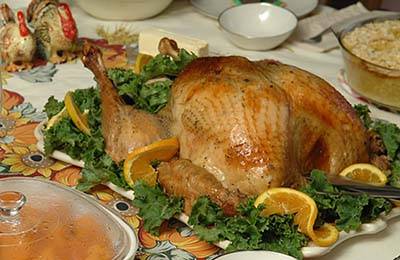 Every year my farmer colleagues receive at least one phone call or email from a well meaning soul in mid-November. The exchanges typically go something like this:
Every year my farmer colleagues receive at least one phone call or email from a well meaning soul in mid-November. The exchanges typically go something like this:
Dear Farmer X:
Hello. I am looking for a 15- to 20-pound turkey. What will the price will be and do you deliver?
Thanks,
S
_ _
Dear S:
We are very sorry but all of the birds have been reserved. We do not know the exact price until the birds are processed because the processing fee must be included in the price and it varies based upon energy prices. Also, we do not know how many birds we will have in the range you requested until they are processed. We do not deliver.
Apologies,
Farmer X
Dear Farmer X:
Thanks for the quick response. So, for next Thanksgiving, what is the latest date that I could reasonably expect to reserve a turkey?
S
_ _
Dear S:
March is when we order our holiday birds, so as close to March as possible.
Thanks,
Farmer X
_ _
I am told the phone exchanges are better than email exchanges because you get to hear the reaction to the previous reply which goes something like this: “March??? Really?? You’re kidding!! March? Really? Wow….March.”
Getting a local bird is not something you can typically do at the last minute, much less spec its weight and have it delivered as if you were ordering a something off a Detroit assembly line.
Local farmers typically raise a few extra birds as a cushion against attacks from raptors and weasels, deaths due to fright from thunderstorms, and more. But with higher feed prices, farmers are keeping their inventories tight. Also, expect to pay more if you are looking for a heritage breed like Bourbon Red or American Bronze, as these take considerably longer to raise and thus, require more feed.
So what do you do if you haven’t yet ordered your holiday bird? Hustle. As of October 26, 2009, the free-range, local turkey situation at area farms was as follows:
Caveny Farm, Monticello, Ill. — Bourbon Red birds available, though not in all sizes
First Fruits, Mahomet, Ill. — birds still available
Moore Family Farm, Watseka, Ill. — sold out
Sonrise, Penfield, Ill. — broad breasted birds still available
Tomahnous Farm, Mahomet, Ill. — heritage breeds and broad breasted birds available
Triple S, Stewardson, Ill. — birds still available through Common Ground Food Coop in Urbana.
If you miss out on getting a turkey, that doesn’t mean you can’t put local, free-range poultry on your holiday table. But, you’ll need to move quickly before your other options disappear, as well.
Chicken
A large roasting hen can feed several people. As these are ready for market in less than half the time of a turkey, several local poultry producers should have them available.
Duck
Moore Family Farm currently has several ducks available.
Geese
Not this year. Caveny Farms has raised geese in the past, but they are on hiatus until a new processor can be found.
Ensuring a Moist Bird
Once you purchase your bird, there are two things you need to do ensure it stays moist: brine it and use a meat thermometer when you cook it.
The famous commercial turkey that most of grew up with comes pre-injected with liquid to keep it from drying out. The best way to keep your holiday bird moist is to brine it. Alton Brown’s orange juice brine has never failed me. I sometimes add a few whole peppercorns and a couple of bay leaves. Alternatively, you can use 2 cups of kosher salt and 2 gallons of water. Rub some of the salt into the skin of the bird. Place the rest into water in a very large (approx. 5 gallon) new plastic bucket or clean, water-tight cooler. Stir to dissolve. Place the turkey in the brine and keep it at 40 degrees F or cooler for 6 to 8 hours. Rinse bird prior to cooking.
Take the bird out of the oven when the breast meat reaches 161 degrees F as it will continue to cook for several minutes once you’ve removed it from the oven. If you use Brown’s cooking instructions, this can be in as little as 2 to 2 ½ hours for a 16- to 18-pound bird.
Photo by: David Riecks








